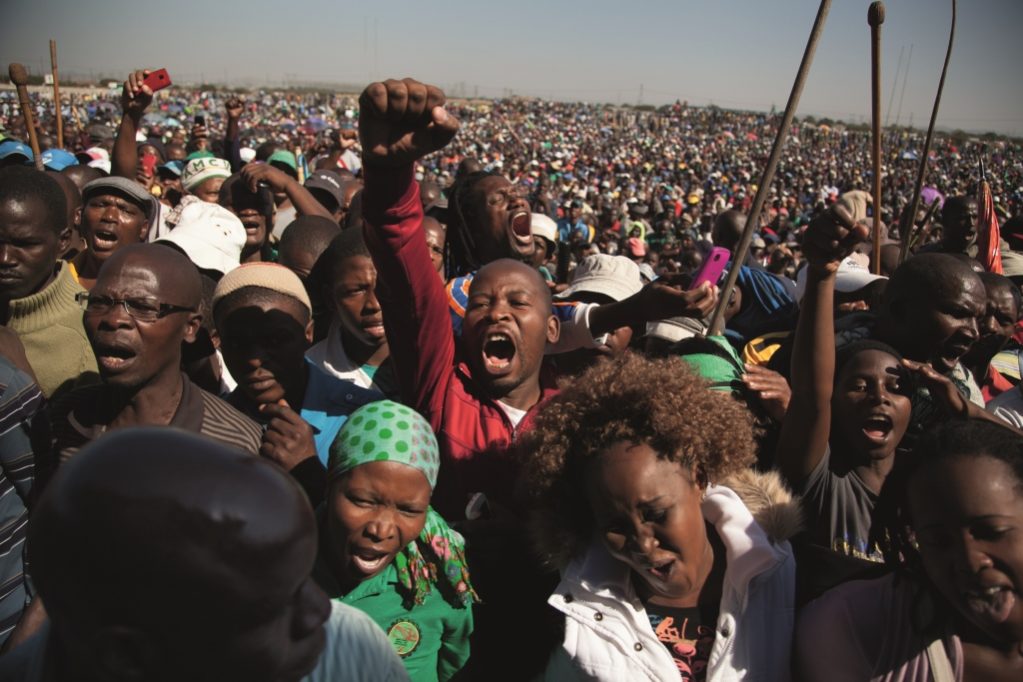By mid-June, as FORBES AFRICA went to press, there was no sign of an end to the longest mining strike in South African history. For five months, Lonim, Implats and Angloplats – which produces 40% of the world’s platinum – lay idle at a cost of more than $2 billion to the economy.
New mining minister Ngoako Ramatlhodi tried to heal the rift in his first few days in office, but fresh talks fizzled out inside two weeks.
May proved a month of tragedy, farce and scorn in the platinum belt of South Africa. Tragedy as 4,000 hungry women and children of miners turned up for 500 food parcels; farce because of Lonmin’s clumsy attempt to end the strike and scorn from most of the miners.
Lonmin issued an ultimatum for miners to report for duty on May 14 and offered to charter buses. Instead, more than 4,000 Association of Mineworkers and Construction Union (Amcu) members gathered at the nearby Wonderkop Stadium, carrying traditional weapons.
Lonmin claims a few slipped past the strikers to work, but police say there were none.
Regardless, Amcu president Joseph Mathunjwa gave assurances to the traditional weapon wielding miners that their jobs were safe in the protracted strike. He accused Lonmin management of undermining the union by talking directly to employees.
“We have the law on our side. The employers have breached the recognition agreement signed between them and Amcu, the majority union in the platinum sector… Don’t allow them to instigate you to the point you do unlawful things,” Mathunjwa warned.
He rubbished allegations his members were responsible for the attacks on the non-striking miners around Rustenburg. Four people died, several others suffered stab wounds.
Mathunjwa further warned that the police deployment to the platinum belt could lead to another Marikana massacre. In August 2012, at least 34 Amcu protesters were shot dead by police in Marikana.
“If the strike is protected and lawful, why is the government deploying police. To do what?” asks Mathunjwa.
“We are so close to Canaan, there’s no way we are returning to Egypt,” says Jimmy Gama, the union’s national treasurer.
A few kilometers from the stadium, where Mathunjwa left in a fleet of luxury vehicles, the central business district of Marikana painted a gloomy and desperate picture. Many businesses have closed since the miners downed tools on January 23.
On May 19, Lonmin management called journalists to their headquarters in Melrose Arch, Johannesburg, they looked and sounded desperate.
“We are asking who is benefitting from the strike. Are the rising incidents of violence not making the strike dysfunctional?” says Lonmin CEO, Ben Magara.
On May 20, platinum bosses and the union met again at the Labor Court in Johannesburg, stripped to the waist and ready to fight each other over whether employers should directly communicate with their employees or not.
Despite the presiding judge, Hilary Rabkin-Naicker, managing to get the two parties back to the negotiating table, no agreement was reached after a week.
“Reaching an affordable and sustainable agreement with Amcu would be in all of our interests, and that remains our preference. We remain committed to on-going dialogue with Amcu and other stakeholders to find a way to end the strike. The companies welcome the intervention of the Labor Court,” says a statement from Lonmin management before the wage impasse.
